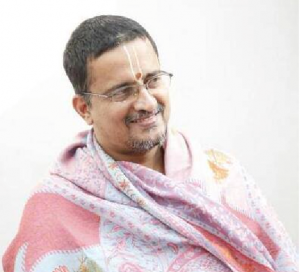People often wonder, “Why do people waste time, money and effort doing Nama sankirtan, building or renovating temples, or even praying for others when—if they really want to serve others—they can use that time more fruitfully by doing actual social service like feeding the hungry, serving the disabled or working with illiterate children?” The following story is an effort to answer such questions. Read on…
“Just give me a tonic for my headache,” screamed John.
“Please let me treat the underlying cause of your headache,” protested Dr. Ram.
 “I care less for the cause! How can you be so uncaring?”
“I care less for the cause! How can you be so uncaring?”
“You have been living with Tylenol and the recurring headache for years now! Don’t you think it’s high time you found a way to reduce its occurrence? Do you want to pop in headache pills all your life?’
“But Doc, is it really possible for my headache to stop permanently?’
“Honestly, I cannot guarantee that. But I can treat the cause to at least reduce it permanently. But you are not allowing me to work on the cause!”
“Doc, a headache is a headache. I don’t know of anything other than the head that can cause a headache.”
“John, causes are subtle and effects are gross” retorted the doctor, “A patient may not see the connection, but the trained eyes of an experienced doctor can.”
“You will pop in your pills for headache anyway,” he continued, “But my job is to find its cause, it can be the eyes or ears, the stomach or even something as subtle as your mental stress at work. Until I treat you for the cause, how can we reduce its occurrence?’
John remained quiet as he began to slowly follow his doctor’s intelligent explanation.
“John, you’re a businessman. Let’s say you have a factory that produces pots. If 20 pots break everyday during production, you may need 20 people if you have to repair them all very quickly. Now consider a good manager. What would he do? He will propose that out of the20 repair people, 10 be moved to fix the cause of the breakage, so that the number of broken pots can reduce over time. There may be protests initially as the repairs cannot be done as quickly as before with fewer people on the repair job. But if the factory’s management is mature, they will agree with the manager’s proposal.
“Once they go through the critical yet thankless task of preventing future pot breakage, slowly yet steadily, the breakage rate will reduce. Do you see John? Here we could see the result of prevention as it reduced adverse results. But often we cannot gauge the effectiveness of prevention with results. What if the factory in question had adopted the prevention practice right from the beginning? The breakage rate would have been low to start with, which is really a better situation than to have a high breakage rate and then bring it down. But in this latter case, not everyone will appreciate the existence of the prevention measure.
“Prevention can only be adopted by conviction, and cannot be gauged by results. In fact, the only way to see the effectiveness of prevention is because it has “no results”. An intelligent person understands the connection intuitively and gets into prevention mode as a principle. This does not mean that repairs should be stopped. Let them continue, but never ever imagine repairing is the only worthwhile activity.”
Complete understanding suddenly dawned on John. He saw the sheer folly of his effort to treat only his ‘gross’ symptomatic headache and not its ‘subtle’ cause. As he thanked Dr. Ram for his immense patience and walked out of the clinic, he could not stop thinking about what the doctor had said about prevention. It could go unnoticed, but it was a much more powerful action than any reactive measure.
In his own life, John was a deeply caring and spiritual person. He wanted to serve the society, but he was beset by doubts about his method of contribution. His practice was to pray fervently for the afflicted. He taught values to children. He helped spread positive spiritual vibrations by regularly chanting the Holy Names. Yet, he sometimes felt that maybe he should work more on conventional social service. Perhaps he should spend more time in soup kitchens and food banks. Or work with the disabled or maybe teach math to underprivileged kids. He had been confused. But now clarity dawned.
Repair and rehabilitation are important, but so is prevention! What he was doing—praying, chanting the Names of God, and helping children develop faith in God—were all preventive actions. The result of praying and chanting may not be direct like filling a homeless person’s stomach, but it could still do the same by inspiring someone else to offer him food; or better still, prayers and chanting the Lord’s Name could even prevent the person from becoming “homeless” in the first place! In which case, of course, the effect is extremely powerful yet so subtle that no one would ever notice its power.
It was a critical decision, but he made his choice. Repairs and prevention were both important, after all. But John saw that most people around him were in the repair mode. He thought, “Am I doing what I do for name or fame? Of course not! When 95% of people are working on repairs, why should I not take up the ‘thankless’ job of prevention?”
That day, a new, divine strength descended on John. He may be smirked at, but he would steam right ahead with the strength of his conviction; he would persevere despite any persecution.
The world is saved from chaos only due to those wonderful souls who can see beyond the visible, who can think beyond the obvious, who serve beyond the popular, and who care beyond their own self!
Sri Ramanujamji, Chennai, India




Thank you Sri Ramanujamji for this wonderful article as it really spoke to my condition! Please continue with the wonderful work you are doing on behalf of Sri Swamiji on spreading this message of spiritual revitalization through the ongoing remembrance of God. The prayers and thoughts of my family and I go out to you and to the other G.O.D. devotees! – Dave from Tehachapi, California!
Thanks for making it crystal clear that the path we are all going is undoubtedly the right one! RR
Ramuji! you have hit the nail on its head!